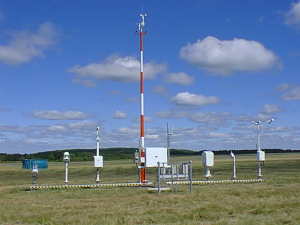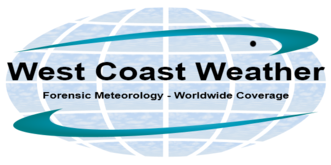Weather Consultants
By Michael FaginHistorical Weather Data, Weather ExpertWith 0 commentsWeather Consultants use records from the National Climatic Data Center (NCDC) database – upper-level atmospheric maps, radar, satellite, hourly and other historical data – to recreate historical weather events. Making that possible are resources provided by the National Weather Service, the Air Force, the FAA, the National Doppler Radar Network, etc. Global data from over 35,000 weather stations is available at the tip of a forecaster’s finger.

Weather Consultants get ASOS weather data
Some stations have recorded the daily weather since the turn of the previous century. Many more were established in the 1940s; and many more yet arrived in the early 1970s. Between 1991-2004, over nine hundred Automated Surface Observing Systems (ASOS) were scattered across the US, replacing human observations. While the accuracy of some measurements may have improved, it diminished the quality of observations of cloud types, measurements of snow on the ground, and liquid water equivalents of ground ice, snow and meltwater.
The original rural placements of some stations have remained rural. Most, especially those built in or near early 20th Century cities, have stood through substantial changes to the terrain, effects from urbanization and various forms of localized climate change – all potentially leading to long-term changes in observed conditions. Often, a weather pro is needed to effectively judge the trustworthiness of both individual data points and data sources.
Certified Consulting Meteorologists (CCMs) deliver expert testimony in legal cases that may hinge on what the weather was like. As long as they deliver their findings without demonstrating bias, judges permit them to investigate and articulate a thorough assessment of the weather conditions during the relevant times at the relevant locations. West Coast Weather’s expert witness is Dr. Mike Witiw, Ph. D CCM.
Litigate or Not: When Would I Hire a Weather Consultant?
When’s a good time to hire a weather consultant? Most clients schedule property insurance claim consultations, i.e. damages to buildings, slip and falls, automobile, aviation, boating and other weather-related accidents. Any time the ruling of a case may pivot on the weather is worth seeking the help of a weather consultant.
A little weather insight may help avoid big court-related expenditures. Such was the case when a defendant’s attorney came to us regarding property sold to the plaintiff. The plaintiff claimed the property, a basement, flooded multiple times between 1/1 – 3/1. The defendant wanted to claim that record snowfall fell during the period. If the weather were exceptionally extreme because of its duration, intensity or factors related to the specific locality, such as a once in a century event, it wouldn’t be reasonable to expect the defendant to exercise adequate precaution – the Act of God defense. After some preliminary research, we found snowfall to be 60% of normal, with typical rainfall amounts and temperatures. The foresight guided the attorney to avoid using that line of defense, including the costs of additional, in-depth research and an official report.
Had unprecedented snowfall in that timespan actually caused the basement to flood, the approach may have saved the defendant far more than the cost of a full consultation. A seemingly solid lawsuit or a sturdy defense can go to a phase in court called discovery – when having a CCM on staff to professionally sort out the vital facts and intricate details can seal up a win.
What details can weather consultants bring to the court? Data from not just the surface but up to well above the clouds is used to establish specific times and characters of precipitation events, temperatures, wind directions and speeds, visibilities, episodes of melting and freezing, and pre-existing conditions such as snowfall depths. Even verifying ambient illumination from the sun or moon, such as visibility in a car during certain times of the day, may be a game changer. When litigation involving the weather may wither a wallet, first consult with a CCM. Free free to contact us if you have some general questions. We are always more than happy to answer some of your questions.
Written by Meterlgolist Geoff Linsley
